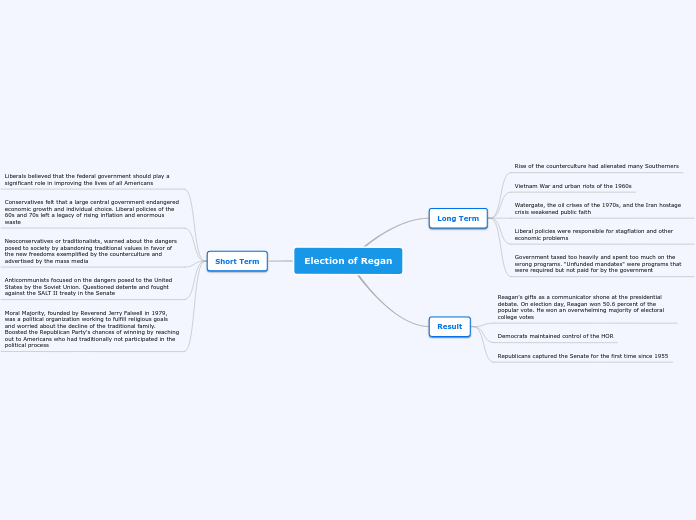Election of Regan
Long Term
Rise of the counterculture had alienated many Southerners
Vietnam War and urban riots of the 1960s
Watergate, the oil crises of the 1970s, and the Iran hostage crisis weakened public faith
Liberal policies were responsible for stagflation and other economic problems
Government taxed too heavily and spent too much on the wrong programs. "Unfunded mandates" were programs that were required but not paid for by the government
Result
Reagan's gifts as a communicator shone at the presidential debate. On election day, Reagan won 50.6 percent of the popular vote. He won an overwhelming majority of electoral college votes
Democrats maintained control of the HOR
Republicans captured the Senate for the first time since 1955
Short Term
Liberals believed that the federal government should play a significant role in improving the lives of all Americans
Conservatives felt that a large central government endangered economic growth and individual choice. Liberal policies of the 60s and 70s left a legacy of rising inflation and enormous waste
Neoconservatives or traditionalists, warned about the dangers posed to society by abandoning traditional values in favor of the new freedoms exemplified by the counterculture and advertised by the mass media
Anticommunists focused on the dangers posed to the United States by the Soviet Union. Questioned detente and fought against the SALT II treaty in the Senate
Moral Majority, founded by Reverend Jerry Falwell in 1979, was a political organization working to fulfill religious goals and worried about the decline of the traditional family. Boosted the Republican Party's chances of winning by reaching out to Americans who had traditionally not participated in the political process
